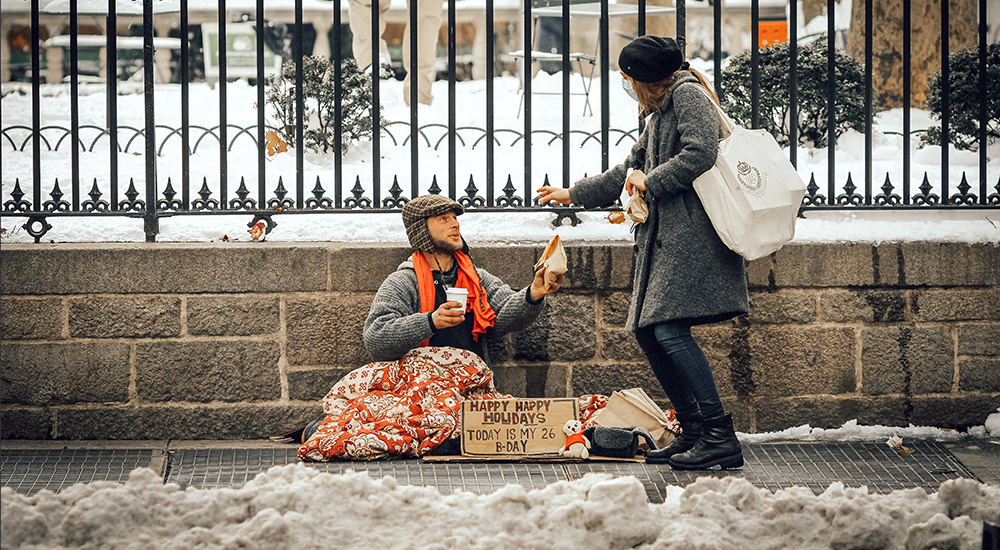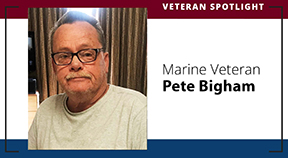Navigating through our own homes isn’t something many of us have to consider from day to day. For Marine Veteran Pete Bigham, it’s always top of mind.
Bigham served as a Heavy Equipment Operator in the Marine Corps from 1975 to 1979. Upon separating from the military and returning to civilian life, he was relieved that his wife had a job that came with enough health insurance to cover his family and himself. When he and his wife decided to divorce some years later, he was grateful to have VA health care as an option.
Bigham discovered VA care at the right time. He was diagnosed with cancer shortly after enrolling. As he continued to experience poor health, he slowly lost the strength and mobility he once took for granted as an athletic Marine.
The saying “Bad things come in threes” is popular for a reason. After a divorce and a cancer diagnosis, life could throw few curveballs that would phase the Veteran. And yet, a cumulation of challenges relating to his physical and financial health became overwhelming. Bigham soon found himself without a place to call home.
Becoming mobile
After speaking with his case manager at the VA Boston Health Care System, Bigham learned that a new authorization from VA was providing Veterans with life-changing resources.
The Johnny Isakson and David P. Roe MD Veterans Health Care and Benefits Improvement Act of 2020 authorizes VA to use appropriated funds for Veterans experiencing homelessness and those enrolled in the HUD-VASH program during the COVID-19 public health emergency.
It has made it possible for VA to provide eligible expenditures, such as food, personal items, household goods, shelter and more for Veterans in dire need.
For Bigham, it paid for the transportation of his nearly 420-pound motorized wheelchair that would give him the mobility – and freedom – he desperately needed. The legislation has also provided Bigham with a place to live.
“VA has done an amazing job trying to do the right things to help our Veterans and making things available to get their needs met,” said Bigham’s case worker, Ponniece Champlin. “Bigham was supported by VA at a time when he desperately needed the help.”
House hunting with hope
Though Bigham’s health is now under control, his housing needs have proven more difficult to meet. Visiting apartment after apartment, with some unable to even fit a wheelchair in the elevator, he has yet to find handicap accessible housing that can accommodate both himself and his caregiver.
And if the elevators are accessible, that doesn’t mean the rooms are. Many have tight doorways and no room for Bigham to get around in his chair.
Permanent housing is the Marine Veteran’s ultimate goal. Still, he’s thankful for the flexible funding that has provided him with a temporary place to call home at his local Extended Stay America.
“It has a little kitchen, hot plates, microwave, a dishwasher. It’s not a bad place,” said Bigham. “VA offers food deliveries and everything. If it wasn’t for VA, I don’t even want to think about where I might be.”
Life changing support
Along with meeting Bigham’s housing and food needs during this difficult time, VA continues to identify services and programs that can improve his quality of life in the interim.
Bigham has an occupational therapist who comes to his room to provide him with care, a benefit courtesy of HUD-VASH. When the occupational therapist was visiting his room, they noticed his shower didn’t have grab bars. That made it an especially dangerous transition for him to step into the bathtub. He has fallen in the tub in the past.
“VA stepped up for me there, too,” Bigham said of the care he’s receiving. “If I need something, it’s there.”
Bigham is still searching for the place he can call home permanently. Still, he is appreciative of the continuous support from VA.
“Pete said the help from VA gave him back his life,” Bigham’s case worker Champlin recalled. “When he said that, it made me really proud to be a VA employee. It made me happy for Bigham at the same time.”
Topics in this story
More Stories
Bob Jesse Award celebrates the achievements of a VA employee and a team or department that exemplifies innovative practices within VA.
The Medical Foster Home program offers Veterans an alternative to nursing homes.
Watch the Under Secretary for Health and a panel of experts discuss VA Health Connect tele-emergency care.








I am also a homelessness survivor (2011-2015) due to the Grant and Per Diem program here in Portland Oregon. I have been in My own place for 7 years now. I can’t thank VA enough for all the assistance I received. I have told other veterans I know here to try to get assistance. It never hurts to try. Thank you VA for all of the ways you help us.